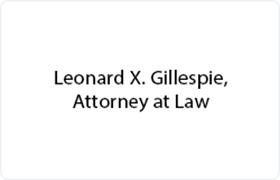New York Misdemeanor Lawyer, New York, page 2
Sponsored Law Firm
-
 x
x

Click For More Info:
-
Leonard X. Gillespie, Attorney at Law
16 Court Street Suite 2504 Brooklyn, NY 11241» view mapDivorce & Family Law We Care About Making A Difference
We are socially conscious, proud to be American and believe that race matters. We care. We want to make a difference.
800-769-4420
Howard David Bader
Real Estate, Misdemeanor, Bankruptcy, Bankruptcy & Debt
Status: In Good Standing Licensed: 50 Years
Seth T. Taube
Lawsuit & Dispute, Misdemeanor, Criminal, Business
Status: In Good Standing Licensed: 45 Years
Joel Scott Ray
Immigration, Employment Discrimination, Misdemeanor
Status: In Good Standing Licensed: 24 Years
Catherine Sylvia Hanley
Intellectual Property, Immigration, Misdemeanor
Status: In Good Standing Licensed: 15 Years
Andrew Hart Rice
Lawsuit, Immigration, Family Law, Misdemeanor
Status: In Good Standing Licensed: 10 Years
Daniel A Graber
Litigation, Wrongful Termination, Misdemeanor, Personal Injury
Status: In Good Standing
Michael Thomas Lynch
Lawsuit, Immigration, Family Law, Misdemeanor
Status: In Good Standing Licensed: 21 Years
 Leonard X. Gillespie Brooklyn, NY
Leonard X. Gillespie Brooklyn, NY Practice AreasExpertise
Practice AreasExpertise
